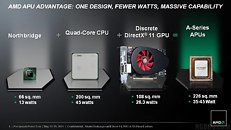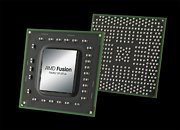Raevenlord
News Editor
- Joined
- Aug 12, 2016
- Messages
- 3,755 (1.23/day)
- Location
- Portugal
| System Name | The Ryzening |
|---|---|
| Processor | AMD Ryzen 9 5900X |
| Motherboard | MSI X570 MAG TOMAHAWK |
| Cooling | Lian Li Galahad 360mm AIO |
| Memory | 32 GB G.Skill Trident Z F4-3733 (4x 8 GB) |
| Video Card(s) | Gigabyte RTX 3070 Ti |
| Storage | Boot: Transcend MTE220S 2TB, Kintson A2000 1TB, Seagate Firewolf Pro 14 TB |
| Display(s) | Acer Nitro VG270UP (1440p 144 Hz IPS) |
| Case | Lian Li O11DX Dynamic White |
| Audio Device(s) | iFi Audio Zen DAC |
| Power Supply | Seasonic Focus+ 750 W |
| Mouse | Cooler Master Masterkeys Lite L |
| Keyboard | Cooler Master Masterkeys Lite L |
| Software | Windows 10 x64 |
As you may remember, "Llano" was somewhat of a disappointment for AMD, to put it mildly. Production issues with partner Global Foundries meant that Llano's roll-out was affected and extended beyond its predicted time-frame. This, in conjunction with other various factors, such as lack of product appeal over disappointing performance and the usual competition from Intel, forced AMD to pull in its second-generation "Trinity" APU too soon. By the time production finally caught up, it ended up overproducing relative to diminishing demand, which resulted in unsold inventory, thus forcing an inventory write-down of "Llano" chips valued at around $100 million. This reduced the company's worth by nearly that much overnight, and tanked the value of the AMD stock. This, of course, didn't sit well with investors.
The as-of-yet ongoing securities fraud lawsuit over AMD's "Llano" APUs has just achieved a milestone, in having been authorized by the Court to proceed as a class action. The Court's decision doesn't imply that the defendants (Rory P. Read, Thomas J. Seifert, Richard A. Bergman, and Dr. Lisa T. Su) did anything wrong. The defendants have not been ordered to pay any money, no settlement has been reached, no money is available as of now and there is no guarantee that there will be in the future.



The lawsuit claims that investors suffered losses resulting from allegedly materially false and misleading statements Defendants made about the manufacturing and subsequent launch of, as well as the demand for, AMD's Llano microprocessor between April 4, 2011 and October 18, 2012, allegedly in violation of the Securities Exchange Act of 1934.
The Court decided that this lawsuit can proceed as a class action because it meets the requirements of Federal Rule of Civil Procedure 23, which governs class actions in federal district courts.In a class action, one or more people called "plaintiffs" sue on behalf of people who have similar claims. The Court must certify the action to proceed as a class action and appoint the "class representatives." All of the individuals and entities on whose behalf the class representatives are suing are known as "class members." Bringing a case as a class action allows the adjudication of many similar claims that might be economically too small to bring individually. One court resolves the issues in the case for all class members, except for those who choose to exclude themselves from the class.
The initial complaint in this action was filed January 15, 2014. After Arkansas Teacher Retirement System and KBC Asset Management NV were appointed as Lead Plaintiffs by the Court, they filed their Corrected Amended Class Action Complaint (the "Complaint") on June 11, 2014. Lead Plaintiffs allege that Defendants made materially false and misleading statements to investors about the manufacturing and subsequent launch of, as well as the demand for, its Llano microprocessor between April 4, 2011 and October 18, 2012, allegedly in violation of the Securities Exchange Act of 1934. Lead Plaintiffs further allege that the false and misleading statements inflated the price of AMD's common stock and that, when Defendants later disclosed the truth of the ongoing problems with Llano, AMD's stock price dropped. The Complaint, which contains all of the Lead Plaintiffs' allegations, is available here.
Defendants moved to dismiss the Complaint on July 7, 2014. On March 31, 2015, the Court issued an order denying Defendants' motion to dismiss.
On September 4, 2015, Lead Plaintiffs filed their motion for class certification. On March 16, 2016, the Court issued an order granting Lead Plaintiffs' motion, certifying the Class, appointing Lead Plaintiffs as "Class Representatives," and appointing Class Counsel.
The parties are currently engaged in discovery, and the deadline for completing discovery is March 3, 2017. The parties must file motions for summary judgment by April 7, 2017. No date for the trial has been scheduled.
View at TechPowerUp Main Site
The as-of-yet ongoing securities fraud lawsuit over AMD's "Llano" APUs has just achieved a milestone, in having been authorized by the Court to proceed as a class action. The Court's decision doesn't imply that the defendants (Rory P. Read, Thomas J. Seifert, Richard A. Bergman, and Dr. Lisa T. Su) did anything wrong. The defendants have not been ordered to pay any money, no settlement has been reached, no money is available as of now and there is no guarantee that there will be in the future.



The lawsuit claims that investors suffered losses resulting from allegedly materially false and misleading statements Defendants made about the manufacturing and subsequent launch of, as well as the demand for, AMD's Llano microprocessor between April 4, 2011 and October 18, 2012, allegedly in violation of the Securities Exchange Act of 1934.
The Court decided that this lawsuit can proceed as a class action because it meets the requirements of Federal Rule of Civil Procedure 23, which governs class actions in federal district courts.In a class action, one or more people called "plaintiffs" sue on behalf of people who have similar claims. The Court must certify the action to proceed as a class action and appoint the "class representatives." All of the individuals and entities on whose behalf the class representatives are suing are known as "class members." Bringing a case as a class action allows the adjudication of many similar claims that might be economically too small to bring individually. One court resolves the issues in the case for all class members, except for those who choose to exclude themselves from the class.
The initial complaint in this action was filed January 15, 2014. After Arkansas Teacher Retirement System and KBC Asset Management NV were appointed as Lead Plaintiffs by the Court, they filed their Corrected Amended Class Action Complaint (the "Complaint") on June 11, 2014. Lead Plaintiffs allege that Defendants made materially false and misleading statements to investors about the manufacturing and subsequent launch of, as well as the demand for, its Llano microprocessor between April 4, 2011 and October 18, 2012, allegedly in violation of the Securities Exchange Act of 1934. Lead Plaintiffs further allege that the false and misleading statements inflated the price of AMD's common stock and that, when Defendants later disclosed the truth of the ongoing problems with Llano, AMD's stock price dropped. The Complaint, which contains all of the Lead Plaintiffs' allegations, is available here.
Defendants moved to dismiss the Complaint on July 7, 2014. On March 31, 2015, the Court issued an order denying Defendants' motion to dismiss.
On September 4, 2015, Lead Plaintiffs filed their motion for class certification. On March 16, 2016, the Court issued an order granting Lead Plaintiffs' motion, certifying the Class, appointing Lead Plaintiffs as "Class Representatives," and appointing Class Counsel.
The parties are currently engaged in discovery, and the deadline for completing discovery is March 3, 2017. The parties must file motions for summary judgment by April 7, 2017. No date for the trial has been scheduled.
View at TechPowerUp Main Site




